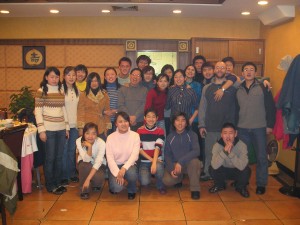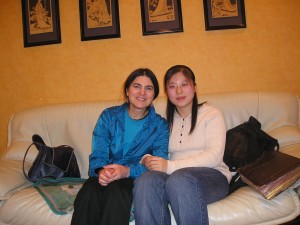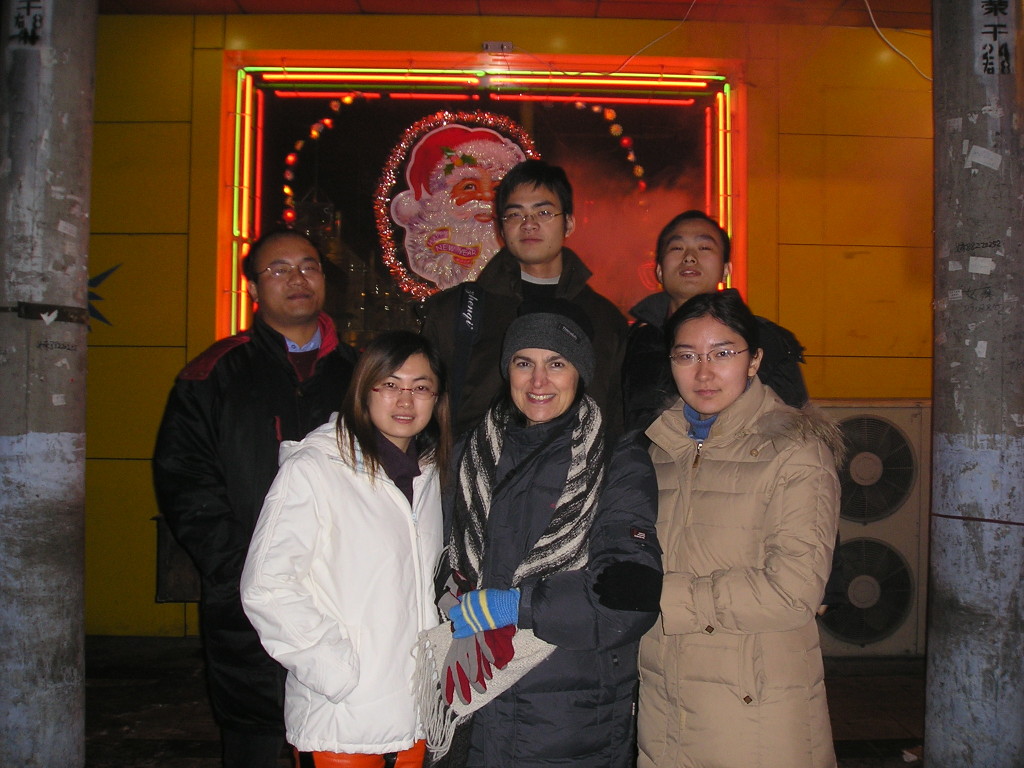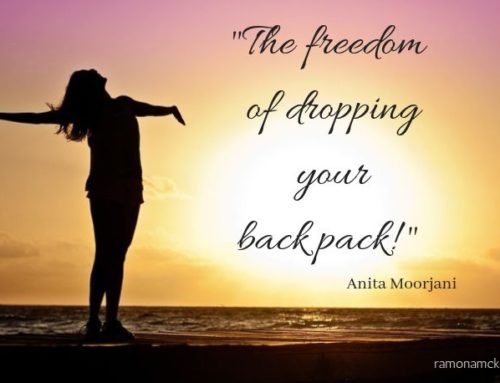When I was a teenager, I thought it was cool to be able to say “I love you” in other languages. Did knowing how to express that sentiment multi-lingually ever appeal to you too? As a high school English teacher in Canada, then as a college and university teacher in China, my students and I had fun with those three words. Here is one of my experiences.
How a Grammar Lesson in China Turned into Love!
Going off on a tangent can be a lot of fun at times. Such was the case one afternoon with one of my first year classes at the Harbin University of Science and Technology. I was getting bored with the grammar lesson so asked, “How do you say ‘I love you’ in Mandarin Chinese?”

2004: One of my classes at the Harbin University of Science & Technology, with me and two of their other foreign teachers.
My students perked up with surprise. “You know,” I continued with a twinkle in my eyes, “it’s the most important thing you need to learn when you study another language.”
 “Wǒ ài nǐ,” a few students chorused! It’s a little like “Woe Eye Knee.” Does that sound romantic to you? With its variable tones, up and down and even, Mandarin can sound a little sing-songy sometimes.
“Wǒ ài nǐ,” a few students chorused! It’s a little like “Woe Eye Knee.” Does that sound romantic to you? With its variable tones, up and down and even, Mandarin can sound a little sing-songy sometimes.
“I want to see what it looks like,” I said. “Will somebody please come up and write it on the board? Both in characters and in pinyin, and help me to say it right.” Everyone was now wide awake and smiling!
[Pinyin is Mandarin sounds expressed using the Western alphabet with markers to indicate the tones. “Wǒ ài nǐ,” is an example.]A girl wrote the characters and pinyin and showed me with body language how I might get the tones right.
“Who knows how to say ‘I love you’ in any language other than Mandarin and English?” I asked. Nobody, so I happily shared from my repertoire.
“Je t’aime – French; ti amo & ti voglio bene – Italian; te amo – Spanish; Ich liebe dich – German; Я тебя люблю (Ya teeb-ya lyu’bl’yu) – Russian.”
I had fun exaggerating the sounds and asked, “Which sounds the most romantic?” Je t’aime and ti amo were the winners. One thing led to another, and the next thing I knew, they were telling me the story of Romeo and Juliet.
A Little Girl Learns Mandarin
I smile at this little sweetheart saying the words then launching into the chorus of a cute puppy love song (“I love you like a mouse loves rice”–Wo ai ni, ai zhi ni, jiu xiang laoshu ai da mi”).
Butterfly Lovers
“In China we have our own Romeo and Juliet story. It’s called Liáng Zhù (梁祝), Butterfly Lovers. Maybe 2000 years old,” a young man informed me. What the students shared was so beautiful that I will save it for another blog. (In the meantime, you may like to look up the story. The music is just a little heart-melting too.)

My students honored me with respect and undisguised caring.
Our lesson on love that day was inadvertent, beautiful and memorable. I think it’s pretty safe to say that all people love love. It’s absolutely true to say that I loved my Chinese students. How could I not, with their unpretentious, kind-hearted ways? Thinking about them, I get nostalgic and all smooshy inside.

I with some of my Masters students from the Harbin Institute of Technology.
Love in Any Language, Sandi Patty
I’ve heard it said that love is a universal language. Yes, there are the words. Then there’s the body language, smiles and tender looks included. It’s a friendly, feel-good language to communicate with. Music’s a universal language too, so here is a little song about the subject at hand.
Do you believe love is a universal language? If so, what does that mean? What does it sound like or look like? Do you know how to say “I love you” in other languages? To you, what’s the most romantic sounding language? Questions, questions! I’d love to read your answers and/or anything else love-related you may care to share. The comment section is below. 🙂
[/fusion_builder_column][/fusion_builder_row][/fusion_builder_container]







I adore Sandi Patty and yes…love is the answer!
I’d never heard of Sandi Patty until a few days before writing this post. This video was played at the New Thought church I attend (the Centre for Inspired Living in Victoria) and I thought, “Perfect!” And it is. Yes, indeed, “love is the answer”! Thank you for your comment.
Ik hou van jou – that’s the dutch ‘I love you’. Sort of pronounced ich (ch with a k sound) how fun jow (ow with a j in front).
That must have been a fun class to teach and I can easily see how your students became involved and enjoyed discussing this. There must have been more than a few giggles in class that day. 🙂
Now I know the Dutch. Thank you, Lenie! My students and I developed such a great relationship. It just about broke my heart to have to leave China after a serious car accident. It was the winter holiday and I wasn’t able to say goodbye or ever see them again.
I love this story, Ramona. It’s great to see that in any culture love is very important. Since I am Italian, I am biased to the Italian language of I love you. Not because of how it sounds, but how my parents would say it to me when I was a kid. It’s a treasured moment now since they have passed. Thank you for sharing.
Sabrina, I am partial to the Italian too! La più bella lingua del mondo, veramente il linguaggio dell’amore. Truly the language of love. 🙂 For me it is the sound and the feelings that the sounds evoke, especially in poetry and songs. Sigh… I am Italian on my dad’s side, though I wasn’t able to learn from him. (He was born in Canada.) As a teenager, I went to Italy, then came back to study two years’ worth of the language at UBC.
To me French is the most romantic sounding language. There is a softness to it in way that you focus on the vowel sounds and not the harsher consonants. Of course, we have been conditioned to associate various romantic images with French so that may be why.
Ken, I think you are right about the vowel sounds. They help to impart a “sensuous” (as in the touching of the senses) quality. In singing, I’ve heard, it’s the vowels that carry melody. French (and the other romance languages too) do have a softness that other “more consonant-based” languages are not known for. And it’s not just the vowels. Even the consonants sound softer! Mmm…are you familiar with Edith Piaf’s singing? Hymne a L’Amour: https://www.youtube.com/watch?v=1gTGmbA40ZQ La Vie en Rose: https://www.youtube.com/watch?v=rzeLynj1GYM
Ken, I cannot resist! Here, in English, is Edith Piaf singing “Hymn to Love.” My God, what a voice she had–-French or English, she’s got me crying. https://www.youtube.com/watch?v=9sIXUyjAACA She is the perfect example to support what you’ve shared.
Great story. I bet that school day is one that sticks in student’s memories. I love the Helen Keller quote at the beginning. I’m not sure I know what love being a universal language means but I can understand that some things must be felt with the heart.
Donna, thank you! Your comment has got me thinking about what I mean about love’s being a “universal language.” A language without words is what comes to mind; namely, body language. For example, compassion can be conveyed with the eyes and the tenderness of a touch; loving respect and genuine pride in someone with a smile; delight with a laugh and simply being with another by really BEING with them. The language of love, unspoken, is louder than words; it is the language of the heart. Helen Keller understood it well. Being unable to hear, she’s someone whose words are well worth taking in.
Ramona, I love the way you describe love as a virtual language without words. Compassion can indeed be conveyed with the eyes (and often more powerfully than with words), tenderness with a touch and respect with a smile.
Donna, you’re such a dear with all your responsiveness. 🙂
Yes,It’s really rewarding to teach languages to people who want to learn, isn’t it. They are so grateful and really make an effort. But I will not teach my asylumseekers to say I love you in Swedish. They could really get into trouble. Above all the ones that are illeterate and have done God knows what to pay people smugglers to get here.
Hi Catarina,
I taught regular English classes in Canada for many years, mostly at the high school level and some at the college. As for ESL (English as a 2nd Language), I volunteer taught adults in Canada, then formally taught 1st year university students in China. Always it was (and is) a true pleasure to teach those who want to learn!
We have Syrian refugees in our city who arrived a couple of months ago. It was my intention to volunteer my services as an English teacher; however, I’ve postponed that plan due to other matters. Oh my, I can only imagine some of the painful stories they could tell. Your teaching asylum seekers is giving them a tremendous gift–the ability to communicate in a new land. Bless you for doing that!
Ramona
I love the French accent and can only imagine how romantic “I love you” must sound in this tongue.
I am only fluent in English. I did not take to French at school as well as I had hoped and failed to see the benefits. Oh how I would love to speak a second language.
Phoenicia, I can relate to your desire. Despite my study of many different languages (French, German, Russian, Italian and Mandarin Chinese), I can only speak English fluently. How deeply rewarding I would find it to be fluent in other languages.
Ramona — even if you’re not fluent I’m sure you can still communicate and be understood in those other languages. That’s a gift. I’d love to know the whole story of how and why you learned Chinese and got to teach in China. The blurb about your book is a real teaser.
Jeannette, the only one of those languages I’d now be able to engage someone in a basic conversation might be the Mandarin. I can at least make myself understood! The others, alas–it’s been too long with no one to speak to.
Now the story of me and China? This may sound weird, but it felt like a door to my Destiny opened wide right before my eyes. On January 3, 2005, a voice from within announced pointblank that I was going to China. It took me completely off guard. From feeling discouraged in pretty much every way, my spirits lifted and instinctively I knew I’d make it happen. I recall returning to work a few days later and telling every teaching colleague, “I’m going to take a leave of absence in September and go to China.” Every person got a big smile on their face, then asked the same questions: “What will you do there?” “Where will you go?”
To both questions I answered: “I don’t know.” People still beamed, gave me two thumbs up or said “right on!” The following months were crazy for elation and big fear. What helped me stay centered was the feeling of being guided. I experienced synchronicities galore, had dreams that provided solutions to problems and managed to distinguish then find the ideal teaching job for myself at a university.
I loved China. Pretty much everything was amazing, even the awful. After only 4 months, I suffered the “really awful” and had to return to Canada. I was in a bizarre car accident: in the middle of the afternoon, on a good quality country road with virtually no traffic, the van I was travelling in met head-on with a bus. The driver died almost instantly and I, sitting in the front passenger seat, survived. How? By the grace of God is the only answer I can come up with. With NO seat belt, I did not go through the windshield nor suffer any brain injury. I was, however, severely injured. In the midst of the horror, I heard an inner voice again, this time indicating that what I was involved in was “part of a bigger picture and a good picture” that would involve me and China.
I was in Chinese hospitals for three days then in Canadian hospitals for 2-3 months. Recovery was a long, painful process. The remarkable thing was that I knew all along that the accident and its purpose were somehow good. After 2-3 years I was as free as I’d be from the physical trauma. After 8 years, I managed to heal the emotional trauma by writing and publishing my book. In an uncanny way (that it absolutely did not even occur to me to try for), I was presented with a perfect book launch venue that happened to fall on Feb. 10, 2013. This was Chinese New Year’s Day and the exact 8th anniversary of the accident.
Later than planned, I’ve just sent the revised version of my book, Dancing in the Heart of the Dragon, to both CreateSpace (Amazon) and a local business for printing. This revised edition should be available within 1-2 weeks.
This sure is a long response, Jeannette. Your comment sure aroused a lot of memories in me!
I just realized that I didn’t mention how I came to study Mandarin. It wasn’t while teaching in China, as I was too busy. I was intent on learning at least a little of the language, so 3 1/2 years after the accident (Aug. 2008), I returned to China to study at a university for a few months. Returning was one of the biggest fears I’ve ever overcome. I’d also vowed to friends 3 1/2 years earlier that I would be back. It mattered to me to deliver on my word. All a part of my healing, I suppose. In Canada I studied at VIU (Vancouver Island University) and a bit at the University of Victoria. I’d honestly consider myself as hardly knowing a thing, and much of what I learned I’ve forgotten. I was in China again in the fall of 2014. (I wrote a blog about some of that trip.) Next time, I want to visit Chengdu in Sichuan province.
Charming and inspirational Ramona! I certainly agree that love is a Universal language, sadly it does seem to be in short supply in some areas these days, but there’s always hope for the future. 🙂
Thank you, Marquita. Yes, the universal language of love does seem in short supply, in many places, and not just with “strangers.” Even families suffer from its lack. A huge load of hurt feelings, resentments and, of course, judgements often virtually kill the underlying love.
This is an interesting story. I want to learn a couple of foreign languages, but I have been procrastinating. I took Spanish in high school and college, but I can’t even remember how to say “I love you” in the language.
Jason, in Canada, French is our official 2nd language. If the USA had an official 2nd, it would be Spanish, sí? Or is it already? At any rate, Spanish might well be a super choice for you. 🙂 If you do that, all the best–todo lo mejor! (I studied a wee bit of Spanish once upon a long time ago.)
Fun post, Ramona, that made us reflect on the importance of love and compassion–in any language. Love and chocolate are indeed the universal ways to open doors and break down barriers between cultures. Thx for sharing this story.
Chocolate–ah yes! Thank you for that, my dear!
When I was 13, my French class went to Quebec for 3 days and we stayed with local families. I was a bit overwhelmed as I was only finishing my first year of French. On the second day of our trip, we spent the day in a French speaking school and we each had a buddy from the school that we spent the day with. The girl I was with went to her school locker, opened it, got a not and she got really excited. I just remember her reading the note: Je t’aime, Je t’aime, Je t’aime (I love you). I felt like I missed a lot of what was said on that trip, but I got that one!
Lovely! What a sweet story, Erica. 🙂 Thanks for sharing.